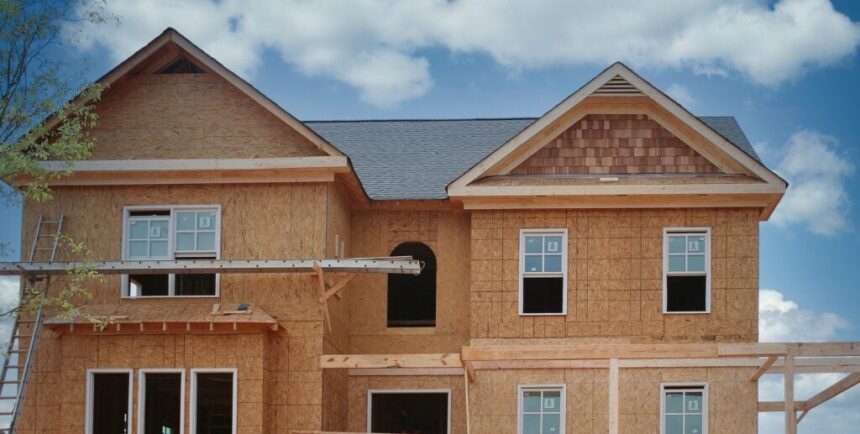The key issue in the U.S. housing market is that there simply aren’t enough homes to keep up with the number of new households forming.
According to the most recent estimates from Freddie Mac (from the fourth quarter of 2020), there’s a shortage of 3.8 million housing units, both for rent and for sale, in the U.S. Home prices are also at record highs, and rising mortgage rates have made buying more expensive.
This means those who do want to buy are faced with competition from cash buyers and baby boomers, who are helping to keep the market moving. This has created new construction opportunities, with new housing sales up 23.8% from a year ago, while existing-home sales have fallen nearly 19% year over year.
But it seems like homebuilders can’t keep up either.
Lack of Inventory, Rising Interest Rates Squeezing the Market
The median home price hit $416,100 in the second quarter of 2023, according to Federal Reserve data. Shelter inflation accounted for nearly 90% of the rise in inflation in July, while mortgage rates have neared 7%. This has reduced home purchasing power, increasing the strain on housing affordability.
“Declining customer traffic is a reminder of the larger challenge that shelter inflation is up 7.7% from a year ago and accounted for a striking 90% of the July Consumer Price Index reading of 3.2%,” said National Association of Home Builders chief economist Robert Dietz.
Nearly two-thirds of current homeowners have interest rates below 4%, creating a lock-in effect. In other words, homeowners have no incentive to sell their homes.
The combined effect of rising interest rates and lack of existing homes has created a large demand for new construction, Sheryl Palmer, chairman and CEO of national homebuilder Taylor Morrison, said on a recent earnings call.
“This has driven meaningful share gains for new construction, with the percentage of new home listings more than doubling from long-term norms to over 30% of the market,” she said. Research from the firm has indicated that buyers prefer new homes, while “underlying demographic strength” has supported this demand despite concerns about rising housing costs, she added.
Homebuilders Are Struggling to Keep Up with Demand
Despite this demand for new homes and increased sales, homebuilding construction appears to be cooling after a surprise surge in May. Housing starts, which measure new home construction, were at a seasonally adjusted annual rate of 1.45 million in July, compared to a revised estimate of 1.39 million in June, according to data from the Census Bureau.
Meanwhile, building permits are down 13% year over year, while housing completions slipped 5.4% compared to a year ago.
While low inventory has boosted interest in new homes, it seems builders are worried that rising interest rates could dampen consumer demand. Builder confidence also retreated in August due to a rise in mortgage rates and high housing inflation, according to the National Association of Home Builders.
Coupled with high construction costs, lack of construction workers, and ongoing supply shortages, builders are concerned that it could remain difficult to meet demand, said NAHB Chairman and homebuilder Alicia Huey.
“While this latest confidence reading is a reminder that housing affordability is an ongoing challenge, demand for new construction continues to be supported by a lack of resale inventory, as many homeowners elect to stay put because they are locked in at a low mortgage rate,” she said.
So What Does This Mean Long Term?
While new construction has helped with the limited housing supply, it hasn’t yet closed the gap, as homebuilders are nearing max capacity. And others aren’t sure if the housing gap will close soon, especially in areas with strict zoning laws.
“The best way to bring housing inflation down and ease the housing affordability crisis is to enact policies at all levels of government that will allow builders to construct more homes to address a nationwide shortfall of approximately 1.5 million housing units,’ said Dietz.
New construction tends to be cyclical, following the trends of the broader market. Whether demand for new homes keeps up with their current pace depends on the overall economy.
While there’s no way to know exactly how the market will fare, the data so far suggests that interest rates will continue to increase slightly, ultimately increasing housing prices as well, especially if the Federal Reserve keeps raising rates. Still, some economists predict that inflation will ease in the coming months as the sharp increase in shelter inflation steadies in line with other inflation data.
“Admittedly, though, there are still risks of reinflation down the line, from rising oil and gas prices and elevated wage growth relative to productivity gains. This risk is especially true if the economy is able to avoid a recession in the coming quarters,” said Nathaniel Drake, economic analyst at Fannie Mae, in a press release regarding inflation numbers.
The Bottom Line
More construction will be needed if the U.S. wants to solve its housing problems. And if mortgage rates don’t fall soon, homebuilding could be the only thing that helps prices fall over the long term. For now, though, homebuilders seem to be in just as short supply as the rest of the housing market.
Ready to succeed in real estate investing? Create a free BiggerPockets account to learn about investment strategies; ask questions and get answers from our community of +2 million members; connect with investor-friendly agents; and so much more.
Note By BiggerPockets: These are opinions written by the author and do not necessarily represent the opinions of BiggerPockets.









